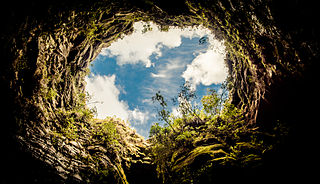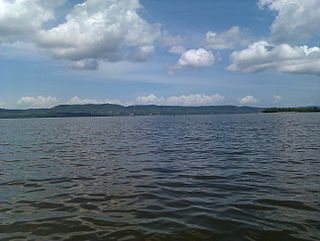Administration
The Descobrimento National Park was created by federal decree of 20 April 1999 with an area of 21,129 hectares (52,210 acres) and expanded to an area of 22,693 hectares (56,080 acres) on 6 June 2012. It became part of the Central Atlantic Forest Ecological Corridor, created in 2002. It is administered by the Chico Mendes Institute for Biodiversity Conservation (ICMBio). The consultative council was established on 1 February 2008, and the management plan was approved on 26 December 2014. The park is classed as IUCN protected area category II (national park). The objective is to preserve a natural ecosystem of great ecological relevance and scenic beauty, and to support scientific research, environmental education and interpretation, outdoors recreation and ecotourism.

Campos Gerais National Park is a national park in the state of Paraná, Brazil.

Serra do Itajaí National Park or Itajaí Mountains National Park is a national park in the state of Santa Catarina, Brazil.

Viruá National Park is a national park in the state of Roraima, Brazil. It protects an area with very infertile sandy soil, periodically flooded, that has no economic value but has exceptionally high biodiversity.
Pau Brasil National Park is a national park in the state of Bahia, Brazil. It preserves a remnant of the Atlantic Forest biome.

Una Biological Reserve is a Biological reserve in Brazil.

Sooretama Biological Reserve (Portuguese: Reserva Biológica de Sooretama is a biological reserve in the state of Espírito Santo, Brazil.
Córrego Grande Biological Reserve is a biological reserve spanning the boundary of Bahia and Espírito Santo, Brazil.

Monte Pascoal National Park is a national park in the state of Bahia, Brazil.

The Rio Preto National Forest is a national forest in the state of Espírito Santo, Brazil.

The Campos Amazônicos National Park is a National park in the states of Rondônia, Amazonas and Mato Grosso, Brazil.

Corumbau Marine Extractive Reserve is a coastal marine extractive reserve in the state of Bahia, Brazil. The reserve was created in 2000 to help protect the traditional local fishing economy, which was suffering from predatory commercial fisheries. It includes an area of corals and rich marine biodiversity, and a breeding ground for humpback whales. Growth in tourism has caused a surge in real estate prices and introduced new social problems among the traditional residents.
The Serra das Lontras National Park (Portuguese: Parque Nacional da Serra das Lontras is a national park in the state of Bahia, Brazil. It protects a rugged area of Atlantic Rainforest with a wide range of bird species, including several that are threatened with extinction.
Boa Nova National Park is a national park in the state of Bahia, Brazil.

Alto Cariri National Park is a national park in Brazil.

The Guaricana National Park is a national park in the state of Paraná, Brazil. It protects a mountainous area holding a remnant of Atlantic Forest.
The Cassurubá Extractive Reserve is an extractive reserve in the state of Bahia, Brazil.

The Baía do Iguape Marine Extractive Reserve is a marine extractive reserve in the state of Bahia, Brazil. As of 2002 the reserve supported about 5,000 people engaged in fishing and shellfish collection.
The Canavieiras Extractive Reserve is a coastal marine extractive reserve in the state of Bahia, Brazil.

The Rio dos Frades Wildlife Refuge is a wildlife refuge in the state of Bahia, Brazil. It protects the land around the mouth of the Frades River. There is pressure, or opportunity, to develop the reserve for tourism.

The Costa das Algas Environmental Protection Area is an environmental protection area in the state of Espírito Santo, Brazil.
This page is based on this
Wikipedia article Text is available under the
CC BY-SA 4.0 license; additional terms may apply.
Images, videos and audio are available under their respective licenses.















